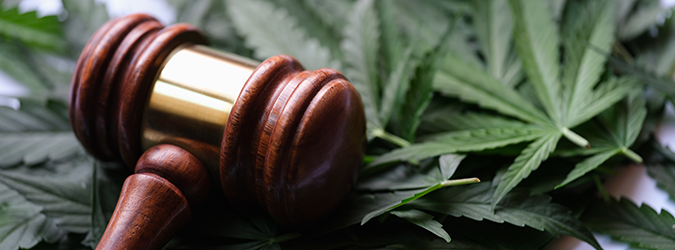NYSBA launches Cannabis Institute With Seminars on Expungement and Examination of Economic Impacts of a Criminal Record
12.16.2021
When New York legalized cannabis earlier this year, its focus on equity prompted an examination of the consequences of the criminal justice system.
“This year, we started talking about what happens to people with criminal records in a real way,” said Emma Goodman, a defense attorney at the Legal Aid Society of New York City. “People can’t get jobs, can’t get life insurance. There are so many things people can’t do because of a criminal conviction they finished serving often decades ago. We are now talking about what this really means for people, for their communities and families.”
Goodman made the comments during the second of two panels the New York State Bar Association hosted on Wednesday during the launch of its Cannabis Institute. The two programs, which featured Goodman, were designed to educate lawyers and the public on how New York’s new law deals with the expungement of certain marijuana offenses.
Goodman cited a February 2021 study by the Brennan Center For Justice that found $1.9 billion in lost earnings for those who have served sentences in New York State prison.
“We can’t separate economic justice from issues of expungement. This is what makes the Marijuana Regulation & Taxation Act so special, so different from what we’ve seen in other states,” said T. Andrew Brown who serves as both NYSBA president and president of Ascend Wellness Holdings (AWH) New York.
AWH is a multi-state cannabis operator that has assets and partners in Illinois, Michigan, Ohio, Massachusetts, and New Jersey, and is working to expand its operations into New York. AWH contributed $10,000 to cover the Continuing Legal Education fees for Wednesday’s classes for up to 200 attorneys who agreed to take on up to three cannabis expungement-related pro bono cases in the coming year.
The first webinar focused on the expungement process in which records of convictions on a host of marijuana convictions will be removed by the New York State Department of Justice. While that process is happening automatically, Goodman and Vicki Belstadt of JustCause took a deep dive into the complexities surrounding record keeping. They noted that the DOJ is supposed to notify law enforcement that the records should be marked as expunged. It’s also possible to ask that the record be destroyed but Goodman said she preferred expungement because there may be circumstances in which it’s helpful for those convicted to find their own criminal records.
Goodman explained that expungement should mean that potential employees can tell employers that they do not have a conviction and that their record should not come up in a background check, but it could still be discovered on applications to become a police officer or carry a firearm.
She said the law does not require that references to past convictions be struck from media accounts, and that would allow potential employers to still find them. However, Goodman and Belstadt encouraged attorneys to get involved in pro bono work to help clients clear records and deal with employment issues caused by past marijuana convictions.
The second webinar featured Sen. Jeremy A. Cooney, Thomas Beauford, Jr., president and CEO of the Buffalo Urban League; Lynelle Bosworth, Greenberg Traurig; Brown and Goodman. Beauford said that his organization was focused on making sure that residents with convictions know that they now have a “second shot” at opportunities once denied to them due to past convictions.
Brown made it clear at both seminars that the issues of legalization and expungement are personal to him.
“Throughout my decades of practice in New York, I have seen firsthand how the war on drugs has targeted communities of color,” he said. “I’ve seen the deep financial, social, cultural, and economic wounds that have yet to heal for too many Black and brown people who have been incarcerated because of minor marijuana infractions. The impact has been catastrophic in my current hometown of Rochester where you are 16 times more likely to be arrested on a marijuana drug charge if you are Black, than, if you are white. The cannabis industry can and should help undo that damage.”






